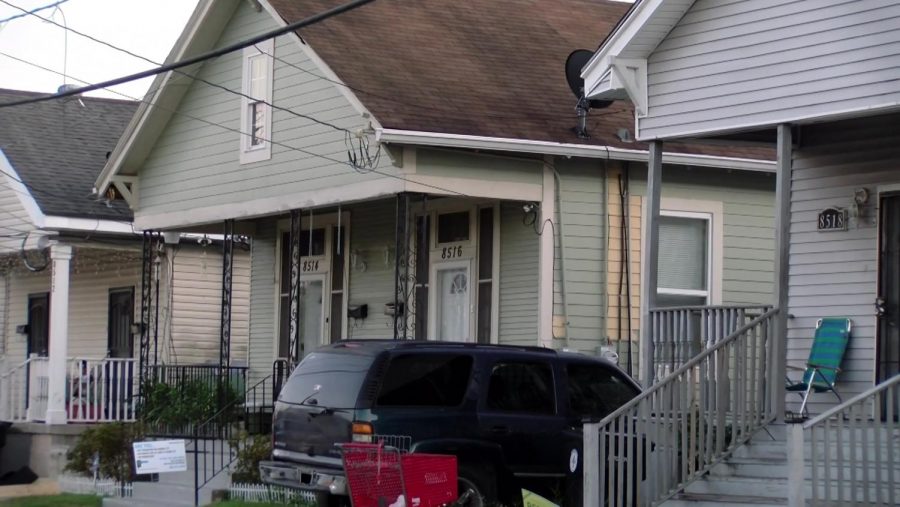Opinion: Speak to homeless people with respect
One helpful resource for homeless people in the New Orleans area is the Travelers Aid Society of Greater New Orleans. This non-profit is committed to preventing homelessness and helping homeless or stranded families and individuals regain a self-sufficient lifestyle. Photo credit: Tess Rowland
February 8, 2020
Whether you’re Uptown or in the French Quarter, homelessness is all around us with New Orleans having a rate of 302 people who are homeless for every 100,000 residents according to the latest point-in-time count done by the city.
So what do you do when you see a homeless person? Do you look away and make quick judgements, or do you see them as somebody who just needs some extra help?
I am challenging you to look past the cardboard sign and understand that the homeless community just needs somebody to view them as normal people. If you feel like you are in a safe environment, ask them questions, talk to them, make a connection and know what resources you can offer them.
One helpful resource for homeless people in the New Orleans area is the Travelers Aid Society of Greater New Orleans. This non-profit is committed to preventing homelessness and helping homeless or stranded families and individuals regain a self-sufficient lifestyle. They offer a day shelter, crisis-intervention counseling, a self-help employment program and so much more.
Through service-learning with the Travelers Aid Society, I have had the opportunity to meet employees and some of their clients. After listening to their stories, I realized that all it takes is communication to make a difference in somebody’s life.
Homeless Street Outreach Specialist Angela Owczarek gave my public relations class some tips and questions to ask when talking to the homeless community.
1. “Hi, my name is __, how are you doing today? Or “I have been seeing you around. What’s your name?”
2. “I don’t have any money, but is there another way I could help you?”
3. “Hi, would you like to talk? Tell me about yourself.”
4. “I know of some local resources that may be able to help. Would you like more information?”
5. “I will keep you in my thoughts,” or “I wish you the best.”
These are just a few examples of helpful things you can say when you encounter a homeless person. Just be kind and treat them how you would want to be treated. You may not be able to solve their problems or offer assistance, but a simple conversation could make a huge difference in their day or in their life.








Brailey Penny • Feb 9, 2020 at 10:25 pm
To the commenter above: I am the author and I have worked with homeless outreach organizations (as stated in the article.) This piece was written as class assignment on behalf of our client, The Travelers Aid Society of Greater New Orleans. I also know people who have been affected by homelessness and people who work with the homeless community/organizations.
This article is simply about how to approach and talk to people in the homeless community because many people are too “scared” to or have many “pre-judgements” or assumptions, among other things. This article is not recommending forcing anybody into rehabilitation. It is simply addressing that New Orleans has a large homeless population, those people are usually judged, recommending a resource (as that resource was our client and is a great organization,) and giving examples of different ways to approach/talk to people in the homeless community. There are also many people that don’t know about the resources that may be available to them, are too scared to seek help, are worried there may be an associated cost, think they may not deserve it, etc. I am aware that there are people in the homeless community do/may have a combination of the things you stated above, but this article was not written to discuss or address that or it would have.
Anyways, that’s all I got for you! Hope you see the comment 🙂
Dan English • Feb 8, 2020 at 9:35 am
Apparently the author of this has never worked with or know anyone that has worked with the transient population. I have.
95% of them or more have one or a combination of the following drug/alcohol/mental health issues that require intervention and rehabilitation.
That is what will help them. The percentage of the population that actively goes about seeking that help is also right around 10% or less of the total.
These are facts and statistics from my own experience as well as the experience of our homeless/transient outreach team in our city.
The fact that at the moment people cannot be forced into rehabilitation is the number one cause of what we see. Please look at actual steps that will help these poor people that need rehabilitation. The ones that do not are not the ones that stay on the street.